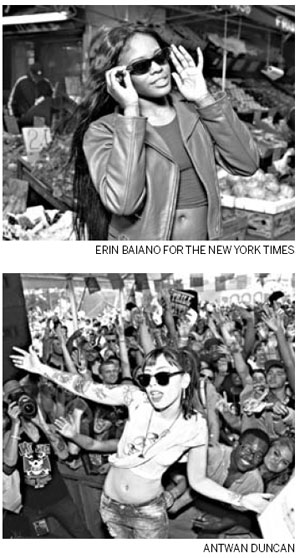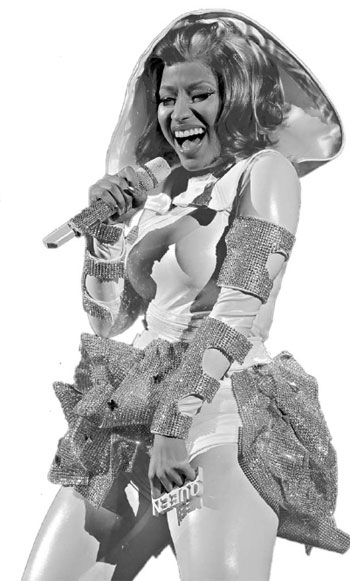Singular idol spawns imitators
Updated: 2012-04-15 07:37
By Jon Caramanica (The New York Times)
|
||||||||

|
The fast-evolving Nicki Minaj, near left, has influenced other female rappers like Azealia Banks, top, and Kreayshawn, bottom. [Erik Lesser / European Pressphoto Agency] |
Nicki Minaj is a rapid evolver. When she released her second album, "Pink Friday: Roman Reloaded," this month, it was as the most influential female rapper of all time.
A few years ago, before her rise began, there were hardly any female rappers of note. Thanks to Nicki Minaj, and to hip-hop's stasis of masculinity, it is a more exciting time to be a female rapper than a male one.
When Nicki Minaj, 29, signed with Lil Wayne's Young Money Records in 2009 on the strength of a couple of years' worth of mixtapes and street DVD appearances, she was brassy and coarse, and intermittently clever. There was little indication that she would drastically rewrite the rules for female rappers.
But she did the obvious, and then more. She became a nimble, evocative rapper. She became an intricate lyricist. She became a thoughtful singer. She became a risky performer. She invented new personae. More than any other rapper in the mainstream, she pushed hard against expectations, and won, morphing into the most eclectic black-music style idol since Grace Jones, and certainly the one with the quickest ascent to the style elite, with a look that's loud, cartoonish and edging toward avant-garde.
It's possible to take just a part of what she's done and come off as refreshing. And that's just what a new wave of female rappers has done. Take the bawdy Harlem artist Azealia Banks, recipient of a heap of Internet affection. Like Nicki Minaj she raps and sings, and plays with various accents.
The Miami rapper Brianna Perry unfurls her syllables in a deliberate, distinctive fashion and adapts her delivery well to the beat.
What Ms. Perry is missing, though, is some of Nicki Minaj's effortlessness: she often appears to be scowling, even when the song calls for something softer.
In a similar way Iggy Azalea, a white Australian woman, is stuck on one mood. She sounds as if she learned to rap for a part in a television movie: she's studied and awkward, an able imitator but not yet capable of more. Some of her rap moves come from Nicki Minaj, particularly the ways in which she tries to bend her voice into different shapes. And she has fully inhaled Nicki Minaj's skewed-Barbie aesthetic.
The white women of the new bunch appear to be playing with visuals the most; in addition to Iggy Azalea that includes Kreayshawn, who is frail as a rapper but, as a carefully pieced together punk-chola doll, was one of last year's more intriguing arrivals.
Iggy Azalea's look is a reminder that for all of Nicki Minaj's achievements, she's still done little to upend the traditional weight of masculinity in hip-hop. And traditional masculine rules still hold sway. Women are still mostly sex objects, and men mostly think of them in commodity terms. Nicki Minaj's music is full of ripostes to this idea, but her image still often works within that old framework.
Because Nicki Minaj is such a malleable polyvalent talent, she's enabled a whole host of new styles, even an anti-Nicki. That would be Nitty Scott, MC, from Brooklyn, who sounds like a mid-'90s naturalist. In essence she strips away all of the things that Nicki Minaj went out of her way to accommodate: flash, gimmickry and the like. Nicki Minaj's ascent gives Nitty Scott something to push back against. She's a wry, melodious and enunciative rapper, the most classically minded of the bunch, but who still might be languishing unnoticed were she not a firm counterpoint to Nicki Minaj.
After some time it's once again de rigueur for male rappers to have one female rapper in their crew: Lola Monroe of Wiz Khalifa's Taylor Gang, or, from Waka Flocka Flame's 1017 Brick Squad, Cartier Kitten.
And Nicki Minaj's success has run parallel to a couple of other female rap mini-movements, including mainstream singers who have made rapping part of their act, like Kesha, Fergie or the intriguing rising British reality-show graduate Cher Lloyd, as well as independent hip-hop figures like the Shabazz Palaces affiliates and 1990s-bohemian revivalists THEESatisfaction.
But where Nicki Minaj's influence may be most vital is on artists who ordinarily have no business rapping, but who see in Nicki a role model. Certainly Amy Heidemann of the grim cutesy-covers duo Karmin has some of Nicki's looseness in her approach. The actress Michelle Trachtenberg was a viral star when she posted video of herself rapping a Nicki song. Last year Taylor Swift was pronouncing Nicki Minaj's "Super Bass" as one of her favorite songs and rapping it for people. And most egregiously there's Katy Perry's recent butchering of "Paris," the neutered title of the Kanye West and Jay-Z hit.
At this point Nicki Minaj is responsible for many children; some of them are bound to misbehave.
The New York Times

 'Taken 2' grabs movie box office crown
'Taken 2' grabs movie box office crown
 Rihanna's 'Diamonds' tops UK pop chart
Rihanna's 'Diamonds' tops UK pop chart
 Fans get look at vintage Rolling Stones
Fans get look at vintage Rolling Stones
 Celebrities attend Power of Women event
Celebrities attend Power of Women event
 Ang Lee breaks 'every rule' to make unlikely new Life of Pi film
Ang Lee breaks 'every rule' to make unlikely new Life of Pi film
 Rihanna almost thrown out of nightclub
Rihanna almost thrown out of nightclub
 'Dark Knight' wins weekend box office
'Dark Knight' wins weekend box office
 'Total Recall' stars gather in Beverly Hills
'Total Recall' stars gather in Beverly Hills
Most Viewed
Editor's Picks

|

|

|

|

|

|
Today's Top News
Health new priority for quake zone
Xi meets US top military officer
Japan's boats driven out of Diaoyu
China mulls online shopping legislation
Bird flu death toll rises to 22
Putin appoints new ambassador to China
Japanese ships blocked from Diaoyu Islands
Inspired by Guan, more Chinese pick up golf
US Weekly

|

|








